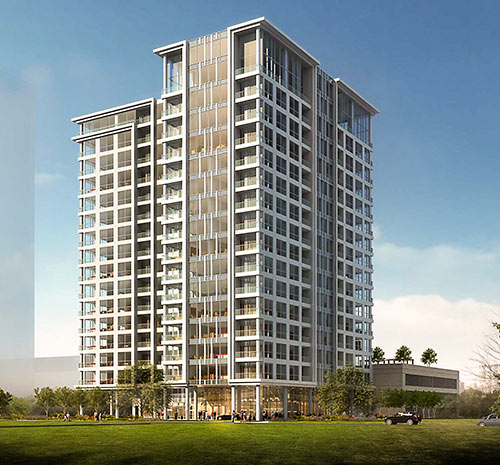
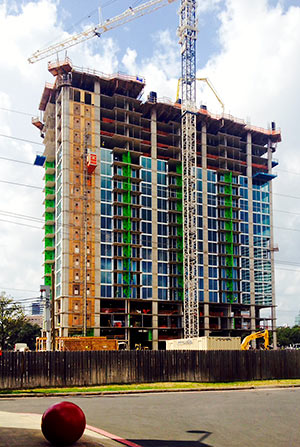 Pictured above on a grassy field standing in for its potential newer neighbors is the 17-story, Kirksey-designed highrise condo building Pelican Builders is planning for a 1.5-acre lot it bought from the site of the former Westcreek Apartments. It’ll go up near the taller SkyHouse River Oaks now under construction on another section of Westcreek Ln. just south of San Felipe (viewed at left from the adjacent Target parking lot). Nancy Sarnoff reports that financing for Pelican’s project hasn’t been finalized, but the company says it plans to begin constructing the project next summer, whether or not it pre-sells any units. It’ll take 2 years to build.
Pictured above on a grassy field standing in for its potential newer neighbors is the 17-story, Kirksey-designed highrise condo building Pelican Builders is planning for a 1.5-acre lot it bought from the site of the former Westcreek Apartments. It’ll go up near the taller SkyHouse River Oaks now under construction on another section of Westcreek Ln. just south of San Felipe (viewed at left from the adjacent Target parking lot). Nancy Sarnoff reports that financing for Pelican’s project hasn’t been finalized, but the company says it plans to begin constructing the project next summer, whether or not it pre-sells any units. It’ll take 2 years to build.
***
Previously, Pelican had announced its intention to build a midrise building and townhouses on the 2 Westcreek parcels it bought. But those plans appear to have changed: Pelican’s Robert Bland tells Sarnoff that in addition to the SkyHouse, the Randall Davis condo fronting San Felipe, and Peloton Commercial’s Westcreek Centre office complex, a hotel and 2 more highrise apartment towers are now planned for the remaining Westcreek lots.
Bland also says the resulting total number of residential units “is not going to be much more” than the 1000-plus in the demolished complex. Pelican is the developer of the nearby Highland Tower.
- Tall buildings to arise near River Oaks District [Houston Chronicle]
- Previously on Swamplot: This 21-Story Office Tower Is Headed for the West Loop’s East Side; Also Replacing the Westcreek Apartments, Besides the SkyHouse: Office Building, Townhouses, Another Midrise, More; What the SkyHouse River Oaks, Not Far from River Oaks, Will Actually Look Like; New ‘River Oaks’ SkyHouse Apartment Tower Wants To Snuggle Up Between Target and the West Loop off San Felipe; The Demolition Situation at the Westcreek Apartments; Evictions at Westcreek Apartments Behind So-Called River Oaks District To Make Way for Demolition, Development; Westcreek Apartments: Refinanced, Waiting
Rendering: Pelican Builders. Photo: Loves Swamplot


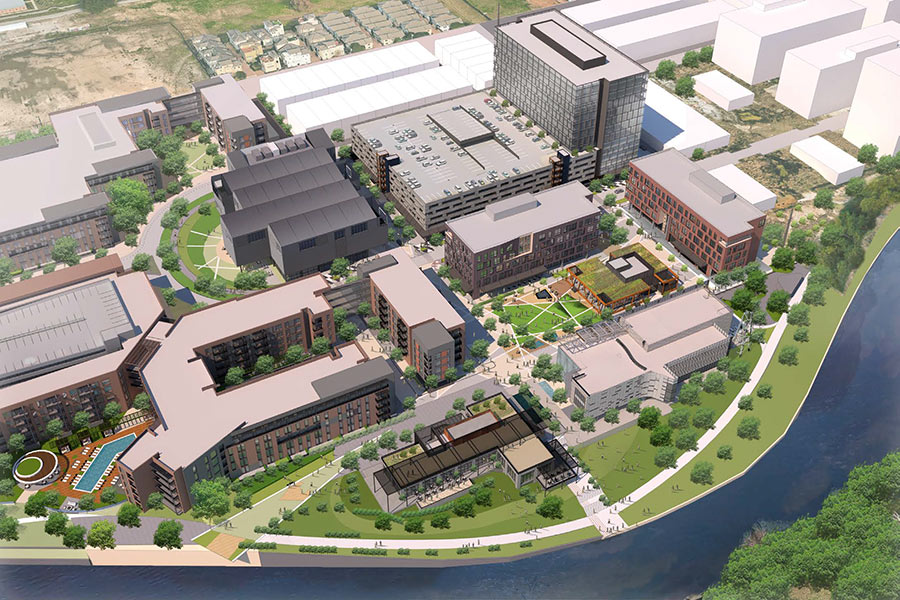
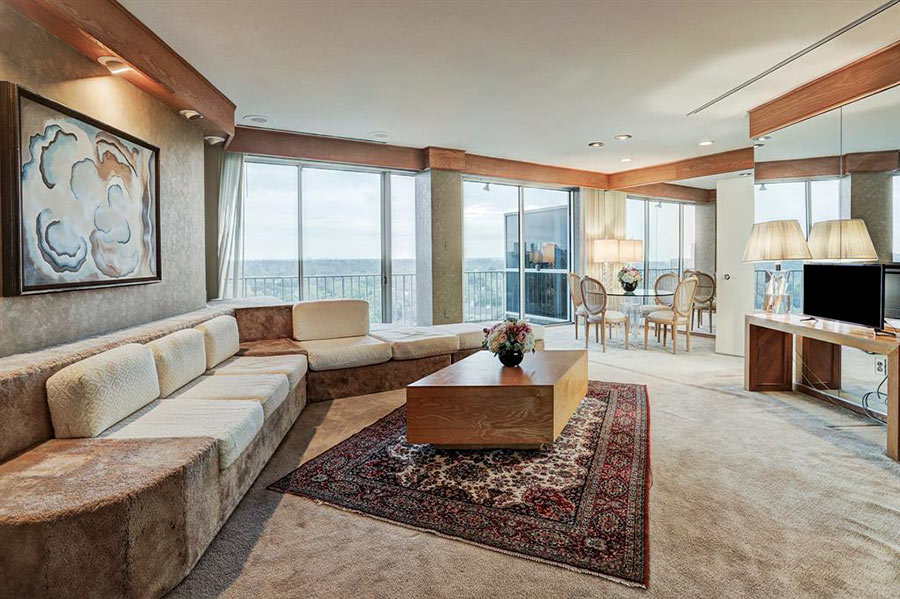
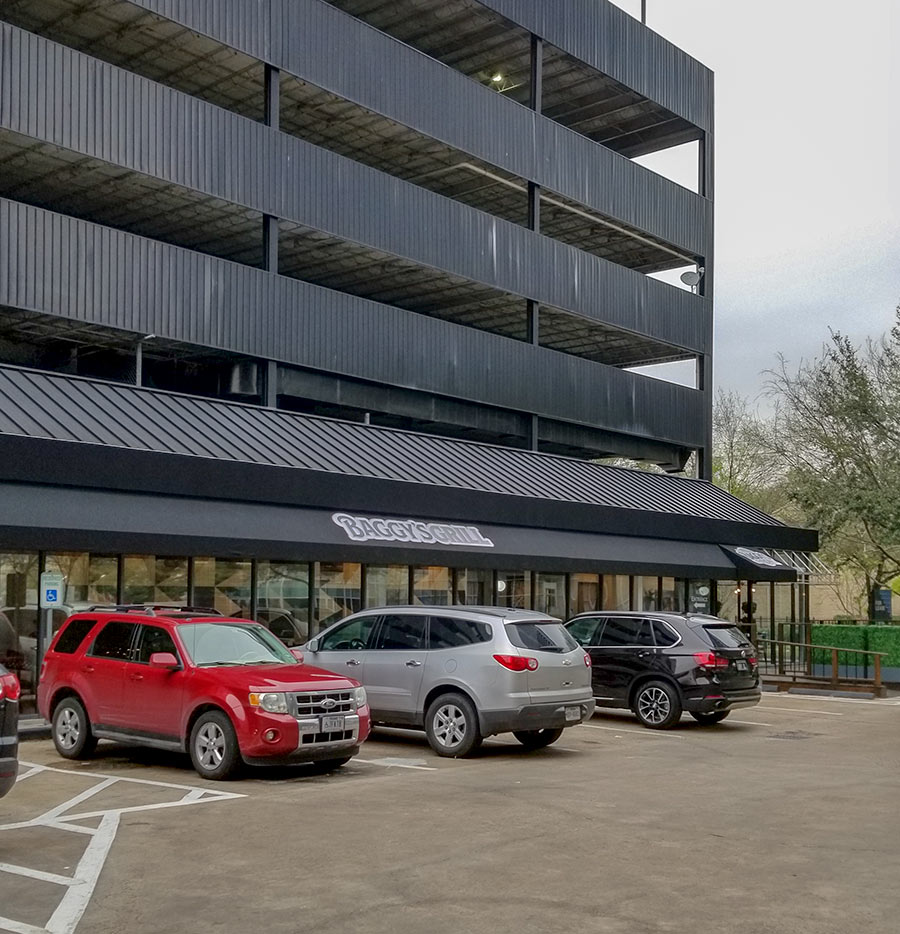
You can’t go wrong in this area. I’m sure in time that Target will be bulldozed as well. The design of this building isn’t bad, it’s not that tall and will make no real impact on the skyline, but as infill it’s adequate. I’m not sure how I will like the end product of River Oaks District, that bland Skyhouse and this building, it hardly adds to the canon of great architecture in Houston. The only thing I know for certain is that traffic in that area will be a nightmare.
W marks the spot.
Although, I think that’s a lame location for a W Hotel. It should totally go in Montrose or the Houston Museum District – edgier, funkier, more nightlife, more of its demographic and lack of hotels make it perfect.
All in favor, say I.
Call me when they have their financing lined up. Until then, it’s just another Regent Square.
How about we finally get our Ritz Carlton back. It would be right up the street from the former Remington/Ritz/Luxury Collection/St Regis. Actually the style is all wrong in this area for a Ritz. The new Ritz in Dallas has a perfect location and gorgeous styling, Houston should take note on how these things are done right instead of this fucked up, haphazard mess they’re making of this area.
There are some very nice buildings going up all over the city. I’ve been here since 1997 and it’s nice to watch the city grow up. Just make me wonder what happens when the energy bubble pops and no one is around to buy a million dollar apartment.
Shannon: “…Houston should take note on how these things are done right instead of this fucked up, haphazard mess they’re making of this area.”
.
Who’s “Houston”? Houston is made of millions of people all making decisions they fell will be rewarded in the best way by doing what the market wants.
.
You seems to imply what gets built where should be determined by some government czar. No thanks.
@ Shannon: Yes, it is possible to go wrong in this area. It is possible to go wrong in any area. The price of the land and the timing to market matter tremendously. As any given highrise takes approximately three years from conception to delivery, and given that so much can happen over that span of time, all that they are are shots in the dark.
@ Tanner: All those who favor W Hotels say “I” instead of “Aye”.
Cody, I’m referring to aesthetics. I know that you really don’t know one style from another and really don’t care if things match or are cohesive, but I do. I appreciated the way Dallas looks crisp and clean and kept up in contrast to Houston that looks haphazard and dirty. I constantly hear from visitors how the city looks dirty and how bizarre to have an old tire store next to a mansion next to a dry cleaner next to a Target and I just don’t bother defending the city anyone, I’m just like yeah, that’s Houston. I appreciate that you appreciated the no zoning any thing goes zest of the city, but not all have your zeal. I like the planned River Oaks Shopping Center (even if it’s slowly ruined) or the planned nature of River Oaks, Hermann Park, and Rice University, instead of an apartment tower next to a Target next to a shopping district next to an office tower next to a house next to rail road track, next to an auto dealerhip.
Shannon, you forgot the nail salon.
I’m waiting to see what kinds of things are built along the LRT lines. That seems like a relatively sure bet. Millennials are more transit-friendly than their predecessors.
Places like River Oaks, Highland Park, and Alamo Heights are bullet proof, you cannot go wrong investing in these areas, period. You may not get an immediate return, but if you can hold it for even a short period of time you’ll make money. I consider these areas and areas like them a sure thing. If I had 4 million right now, I’d buy a Staub classic in RO and sit on it for 10 years.
Psst…Shannon, your Dallas is showing.
@ anon22: It is said (mostly in a patronizing tone by people who are not millenials) that millennials are supposed to like transit. Considering their crappy employment prospects, you’d expect that they might realize some economic benefit from using it.
However, this is not a trend borne out at all by data. The share of millenials living in America’s core cities has actually declined over the past several years. Cities favored by yesterday’s youth, like New York City, Chicago, Boston, San Francisco, and even Portland, OR have actually been hemorrhaging residents in the 20-29-year-old demographics. Surveys of millenial preferences indicate an increasing preference for the suburbs. Transit use nationwide is declining both in absolute terms and as a percentage of commuters, and this trend does not pass over cities with extensively developed rail-based transit.
Rail lines in the area connecting to downtown would be gold with the dense development; the streets are time consuming, inch by inch congested zones. Too bad Republicans hate transit, cities in general, and disregard the environment.
@shannon where is this mansion that you mention next to a old tire shop ?
Where is the auto dealership you speak of ?
Millenials live in the suburbs because their parents live there and they live with their parents not because they want to live out there. Millenials tend to be progressive and I highly doubt they have a love affair with the mote conservative suburbs, they live there because they have no choice. It’s your data that’s flawed.
I think millennials have definitely been priced out of those cities, but maintain preferences for that quality of life.
yeah, let me just hop on the LRT or take a bus and ride out to my new job in the energy corridor, or the exxon-mobil corridor or greenspoint area…..wait, there’s a problem here isn’t there. most millenials don’t work downtown and even fewer live along the LRT corridor.
@ anon22 & Shannon: Fine then, reject my data out of hand and substitute it with bold-faced hypocrisy. I could have added that St. Louis was the biggest loser in spite of not being so expensive or that the biggest gainers are San Antonio, Inland Empire, CA, and Orlando, FL, all of which have a distinctly suburban flavor about them…but I didn’t anticipate that you would make such an idiotic counterargument.
The thing is… If millenials aren’t living in transit-rich core cities because they’re too poor and because those places are too expensive and are so expensive because they’re increasingly full of wealthier Gen-Xers and Boomers that are driving the prices ever-higher, then the argument that a significant quantity of expensive brand-spanking-new transit-oriented development will crop up in order to serve millenials seems weak (to put it politely).
They would make more money renting these high-rises than they do selling the units off since one could use the building as a REIT investment and most renters even in a slow economy will pay $2.00 plus a square foot just to live in a high-rise. This development at one time was to be the new home of a W Hotel, so the original plans or the footprint of the site does have a space set aside for the hotel.
Well…it needs to be said that the “millennial” thing is really limited to the subset of millennials who read articles about millennials. Like most people in this country, they mostly live nowhere near large cities and likely have little to no say about their own employment options. Of the ones that do have options, they will probably “follow the jobs” to outer suburban rings or to the center cities. The best city cores – the ones with the best jobs – are unattainable, possibly motivating them to attempt to maintain their quality of life in exurbs of those cities.
.
Houston has the possibility of creating a desirable city core. Irrespective of millennials, Houston’s inner city is densifying and LRT could be an amenity that attracts a certain kind of development. I don’t know. But I still think it would be interesting to see if this place is able to attract the millennials that prefer that kind of development, irrespective of whether or not they actually use LRT or even any public transit at all.
“I appreciated the way Dallas looks crisp and clean and kept up”
I would really like to visit this Dallas you speak of. How exactly do you get to this parallel universe of yours.
Anon22 is correct about Millennials and their preferences for using public transit over driving a personal car, and also that there is a strong trend towards Millennials moving to urban cores. TheNiche is correct that the cities of New York and San Francisco are not as attractive as they once were to young educated people. This is primarily a result of them being priced out of these markets. However, very recent studies show that young college grads are flooding into cities that are either cheaper to live in, or smaller. Houston actually leads the list of places attracting this demographic as a percentage change from a decade ago.
Here’s a PIRG study released last month that delves into Millennial’s preferences for public transit: http://www.copirg.org/sites/pirg/files/reports/Millennials%20in%20Motion%20CoPIRG.pdf
.
And here’s a link to a study on the same topic that came out this summer http://www.aarp.org/content/dam/aarp/livable-communities/apta-millennials-and-mobility
.
Finally, data from today’s New York Times documenting which cities have the highest growth of Millennials with college degrees, and showing Houston to be #1:
http://www.nytimes.com/2014/10/20/upshot/where-young-college-graduates-are-choosing-to-live.html?hp&action=click&pgtype=Homepage&version=HpSumSmallMediaHigh&module=second-column-region®ion=top-news&WT.nav=top-news&_r=0&abt=0002&abg=0
Awp–Drive I45 through Harris County then drive I 45 /SH 75 through Dallas County and come back with a comparison
@ ShadyHeightster: Ah, so before we were talking about millenials, and now you want to talk about college-educated millenials. Fine then, tell me: what do the white 20-something householders earning $75k or greater per year think? What does the second-generation daughter of an immigrant family think as she struggles with being a single mother and going to community college? Which sort of millenial is more similar to ‘demographic normal’? And where does ‘normal’ want to live? The fact is, both your data and mine is perfectly valid. It’s just that yours tells the story of apples and mine tells the story of the whole fruit basket.
I’m perfectly comfortable saying that millenials contribute to aggregate demand for new urban transit-oriented multifamily, but they aren’t the price-makers. (And in particular for a condo tower like this — to try and stay a little bit on topic — they aren’t the prospective buyers and they aren’t the future residents. They haven’t got the wealth, the income, the credit score, and by and large they’re too transient. Maybe in another ten years, some of them, the ones that are financially illiterate enough to buy into a highrise condo project.)
@JT so just because the drive on a stretch of freeway thru one city is nicer what does that mean ? Nothing besides 45 goes thru a nicer portion of Dallas then it does in Houston. Drive down I-10 from downtown to Katy, drive the Westloop, hell drive 45 thru The Woodlands.
JT,
To make the comparison more fair you should drive 75 North of Dallas and 45 North of Houston, and 45 South of Dallas and 288 South of Houston.
Building this us